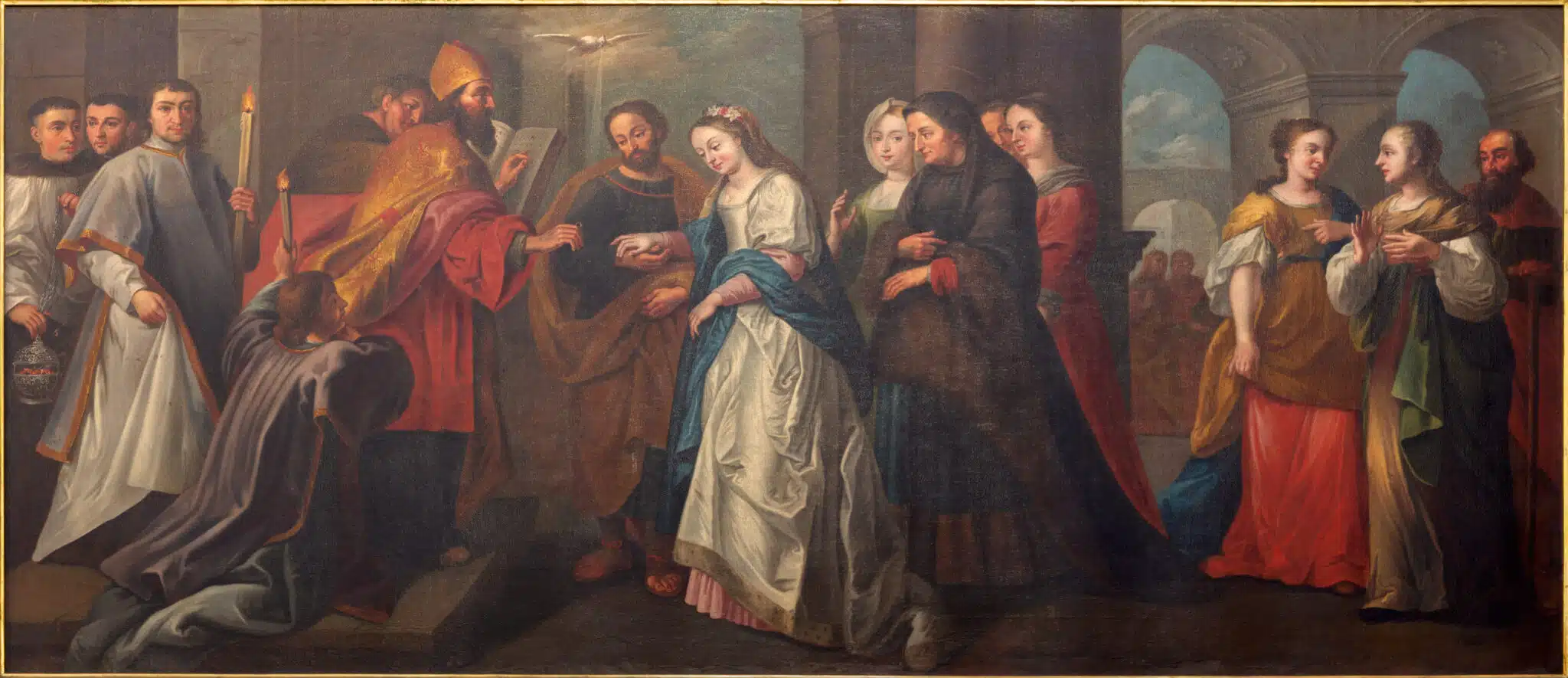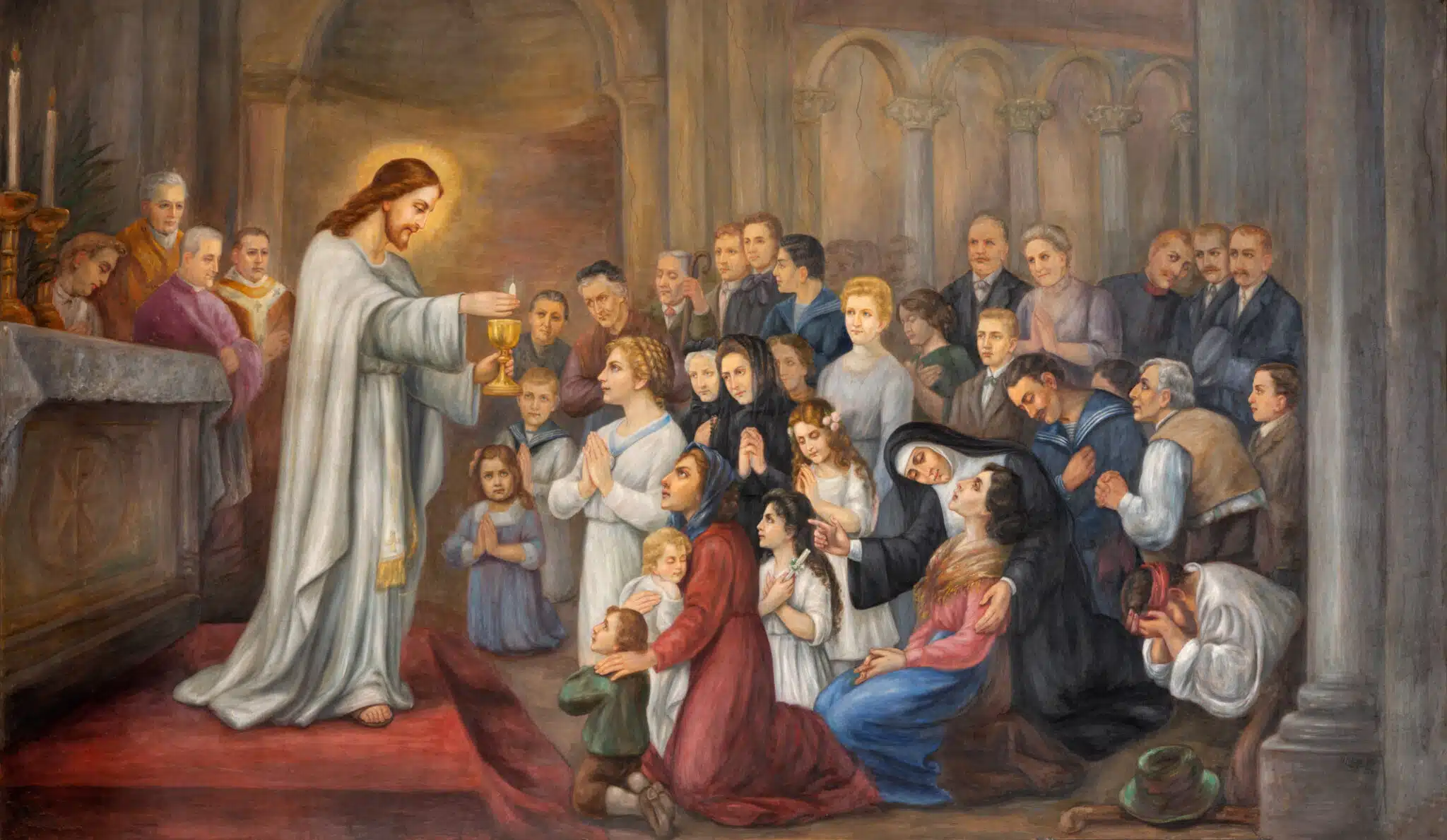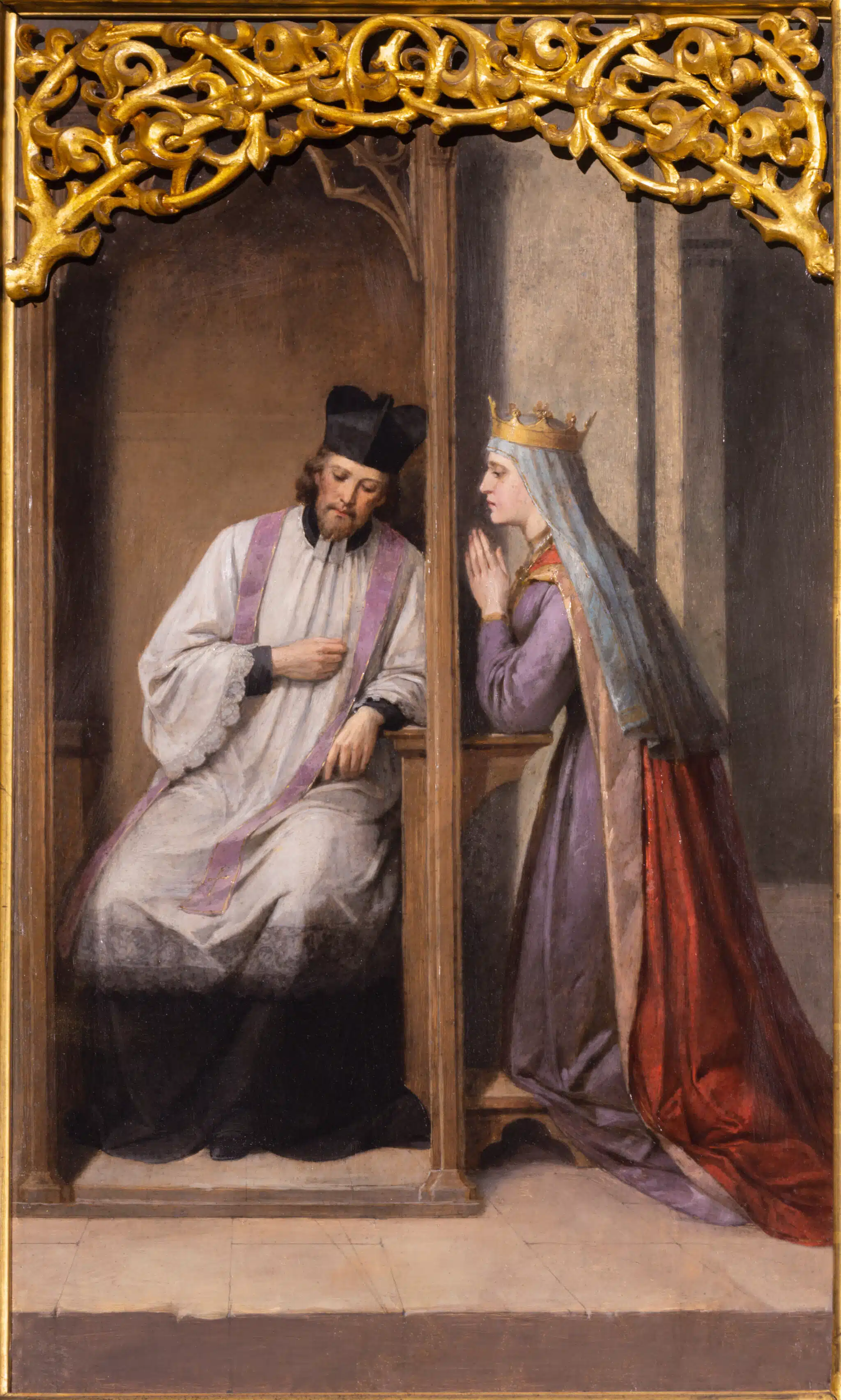We have other articles dealing with the motives, threats, and devastating consequences of adultery. In this article, we would like to answer the question: why is adultery a grave sin? This way of approaching the issue is a doctrinal approach. We will answer the question drawing from the teachings of the Bible and the teachings of the Catholic Church, especially the Catechism and other documents of the Magisterium.
The importance of this way of approaching the issue of adultery is founded upon the fact that God Himself is the Author of marriage. Moreover, He created marriage with certain goods and laws that cannot be changed by human will, neither by the state nor society. As Pope Saint Paul VI expressed in his beautiful encyclical Humanae Vitae:
Married love particularly reveals its true nature and nobility when we realize that it takes its origin from God, who “is love,” (1 John 4:8), the Father “from whom every family in heaven and on earth is named” (Ephesians 3:15). Marriage, then, is far from being the effect of chance or the result of the blind evolution of natural forces. It is in reality the wise and provident institution of God the Creator, whose purpose was to effect in man His loving design. As a consequence, husband and wife, through that mutual gift of themselves, which is specific and exclusive to them alone, develop that union of two persons in which they perfect one another, cooperating with God in the generation and rearing of new lives. The marriage of those who have been baptized is, in addition, invested with the dignity of a sacramental sign of grace, for it represents the union of Christ and His Church. (8, emphasis added)
From this text we can infer that marriage is:
- part of the wise and loving design of God for humanity
- the loving union of one man and one woman through the mutual gift of themselves
- the institution God has designed to transmit human life through such loving union
- the union Christ has raised to the dignity of a sacrament to mirror His love for His Church
These are profound truths. Adultery is a betrayal of each one of them. That is why this sin is so serious and devastating. It is a grievous sin against God, against the human person (innocent spouses and children), against the Church, and against society.
The Catechism (no. 2380) defines adultery in the following manner:
Adultery refers to marital infidelity. When two partners, of whom at least one is married to another party, have sexual relations—even transient ones—they commit adultery. Christ condemns even adultery of mere desire (see Matthew 5:27-28). The sixth commandment and the New Testament forbid adultery absolutely (see Exodus 20:14; Mathew 5:32; 19:6; Mark 10:11, and 1 Corinthians 6:9-10). The prophets denounce the gravity of adultery; they see it as an image of the sin of idolatry (see Hosea 2:7; Jeremiah 5:7; 13:27).
Unpacking this definition, we have the following topics of inquiry:
- How was Israel’s understanding of the 6th commandment affected by polygamy and divorce?
- What was the teaching of the prophets?
- What was the teaching of the Wisdom literature?
- What was the teaching of Jesus about adultery of the heart?
- What did the Church Fathers say about adultery?
The 6th Commandment, Polygamy, and Divorce
The central teaching of the Old Testament against adultery is, of course, the sixth commandment: “Thou shalt not commit adultery” (Exodus 20:14). This commandment is reinforced in its interior dimension by the ninth commandment: “Thou shalt not covet thy neighbor’s wife” (v. 17).

Moses with the Tables of the Law ~ Guido Reni
Moreover, it was clear to everybody in Israel that God had instituted marriage and the family during His original creation of man and woman. Genesis 1:26-28 teaches that God created man and woman in His image and likeness and told them to fill the earth with children. In Genesis 2:24, God explicitly instituted marriage as one and indissoluble: “Therefore a man leaves his father and his mother and clings to his wife, and they become one flesh.”
However, because of the distortions of human sexuality caused by original sin (see Genesis 3), Israel and her leaders lacked a profound understanding of these commandments. Their perception of both marriage and adultery tended to be legalistic without reaching the depths of what marriage really is and, by implication, lacking an understanding of the seriousness of this particular sin.
One of the concrete factors that contributed to this lack was the practice of polygamy. The patriarchs and even kings, such as David and Solomon, practiced polygamy. Even though polygamy was never positively legalized in the Old Testament nor practiced by Israel at large, but only by those who could afford more than one wife, the People of God had such respect for the patriarchs and kings that they did not question this blatant contradiction. In fact, it was tolerated by never being condemned by the laws of Israel. The book of Leviticus, which contains many detailed laws and statutes, says nothing about polygamy.
The original concept of marriage as designed by God was also obscured by the sad acceptance of divorce. The plague of legal divorce existed in Israel since the exodus from Egypt (see Deut. 24:1-4). Once again, a legalistic conception of both marriage and adultery had the upper hand particularly in the legal framework of the new nation.

The Holy Family’s example of marriage; the painting of Wedding of Virgin Mary and St. Joseph in church Kostel Svatého Havla, Prague, Czech Republic, by unknown Baroque artist
It is true that Leviticus very harshly penalized adultery with death for both the man and the woman who committed this sin (see Lev. 20:10). But in such cases, adultery was defined as having sexual relations with the wife of one’s neighbor who, due to polygamy, could be one of several. Thus, the original concept of marriage as one and indissoluble was obscured by the practice of polygamy and divorce, as well as by the legalistic conception of both marriage and adultery that ensued from such obscurity.
The Prophets on Adultery
The prophets were the mouthpiece of God for the People of Israel. They reminded the People of their covenant with God and especially of the Ten Commandments. The prophets Isaiah, Jeremiah, Ezekiel, and Hosea strongly condemned the sin of idolatry. They had one common theme in their condemnation of idolatry that is of paramount importance for a true understanding of marriage and adultery.
These prophets condemned idolatry by means of the marriage analogy. They condemned idolatry as adultery against God. The Lord Yahweh was the Husband of Israel, His Wife. By sacrificing to the idols and going after other gods, the People of God, including their kings, were betraying the Covenant with God. They were being unfaithful to Yahweh, their Creator, Redeemer, and first Love (Husband).
But Yahweh did not abandon them. Even though He chastised them for their adulterous idolatry, He was always ready to accept their repentance and take them back. Perhaps the best expression of this beautiful teaching is found in Isaiah 54:4-8. In this passage, Yahweh identifies Himself as the Maker, Husband, and Redeemer of Israel. This passage is fulfilled in Ephesians 5:21-32, where Jesus is identified by St. Paul as both the Savior and Husband of the Church (and through the Church, the rest of humanity).
The contribution of the prophetic tradition is that it prepared the way for the People of God (Israel in the Old Testament, the Church in the New) to experience the love of God, not only as their Creator and Father, but also as their Redeemer and Husband. In sum, God’s love for us is not only fatherly, but also conjugal.
The prophetic tradition also brought to light the unity and indissolubility of the conjugal union between God and Israel and therefore the same unity and indissolubility that ought to characterize human marriage. Otherwise, the marriage analogy could not adequately reflect the marital covenant between Yahweh and Israel nor, centuries later, between Christ and His Church.

Jesus giving Communion, fresco from end of 19th cent.
Adultery is then an objective and concrete act because it is performed through the body, an objective reality. Through the body, adultery drags the totality of the human person, body and soul, into this awful sin.
Wisdom Literature on Adultery
The reader might ask, what about the interior dimension of adultery? Wasn’t that concept also present in the Old Testament as a way to prepare for Jesus’s teaching on adultery of the heart?
The Wisdom literature (Proverbs, Sirach, Wisdom, etc.) provides us with that insight. They consist in vivid descriptions of the foolishness of the young man who falls for the seductions of the “evil woman” or the foolish woman who falls for the seductions of the “evil man.” We read in Sirach 24:16-23 the awful scene of adulterers of both sexes who let themselves be entrapped by the allurements of women and men other than their spouses. Here, the sacred author uses the powerful image of “blazing fire” (v. 16) to describe the lustful passion.
It is true that passages such as this one about the interior dimension of adultery are more psychological descriptions than theological explanations of this adultery of the heart. Nevertheless, they are framed as existing within the context of a lack of a healthy fear of God and a violation of His Law (see vv. 18 and 23). Therefore, with all their limitations, these descriptions did prepare the way for Jesus’ teaching on adultery of the heart.
Jesus on Adultery of the Heart
In His Sermon on the Mount (Matt. 5-7), the most important of His sermons, Jesus said: “Do not think that I have come to abolish the Law and the Prophets. I have come not to abolish them but to fulfil them” (Matt. 5:17). Jesus fulfilled the Law, the Ten Commandments, and the Prophet’s teachings first and foremost in His own person: His example, His teachings, His miracles, His passion, His death on the cross, and His Resurrection.

Sermon on the Mount ~ Carl Bloch
In regard to His teachings, Jesus emphasized the origin of any good or bad act in the heart, the center of the human person, where we decide for God or against Him. In the Sermon of the Mount, we find what has been called Jesus’ “I sayings,” in which Jesus teaches that it is not enough to avoid sinning exteriorly against the commandments: we must also guard our interior heart.
The “I sayings” of Jesus are of supreme importance. By means of them Jesus is not only speaking on behalf of God, like the prophets of old, but in the stead of God. In other words, He is speaking as God Himself! And His interpretation of the Law of God is the definitive interpretation (see for example: Matt. 5:21-22; 27-28, 31-32, 33-37, 38-42, and 43-44.)
The passage that concerns us here is 5:27-28:
You have heard that it was said to them of old: Thou shalt not commit adultery. But I say to you, that whosever shall look on a woman to lust after her, hath already committed adultery with her in his heart. (emphasis added)
When Jesus condemns adultery of the heart, He is condemning the very root of adultery, which is the capital sin of lust. The Catechism, no. 2351 defines lust as:
The disordered desire for or inordinate enjoyment of sexual pleasure. Sexual pleasure is morally disordered when sought for itself, isolated from its procreative and unitive purposes.
Jesus was not condemning loving sexual desire within the context of marriage. On the contrary, He was saving true sexual desire from lust. His harsh warning against lust was designed, among other things, to save marriage from adultery and to protect women from the selfishness of men. This is evident in the fact that Jesus raised marriage to the dignity of a sacrament. Moreover, His own Apostle Paul used the sacrament of marriage as an analogy to illustrate the spiritual marriage between Christ and His Church (see Eph. 5:21-33).
What Jesus is condemning is selfish sexual desire, when such desire is sought for its own sake as the primary goal and apart from conjugal love and openness to life. This is very important because it means that adultery of the heart can occur within marriage itself! Notice that Jesus said, “whosoever shall look on a woman….” He did not refer only to a woman who is not a man’s wife, but any woman, including one’s wife.
It could not have been in any other way. Just imagine that Jesus was only referring to women who are not a man’s wife. Then any married man could always look lustfully at his wife without any regard for true love and openness to life, as if his wife were just an object of pleasure. How do you think wives of such men would feel?
With His explosive teaching, Jesus was cutting to the root of the problem – not only of adultery, but of any distortion of true sexual love: contraception, fornication, pornography, homosexuality, and all kinds of sexual immorality. Let’s face it. We live in a hypersexualized society. In fact, our culture has become so perverse that there are adults dedicated to the rape and sexualization of children! Child pornography has become an epidemic.
Those who argue that this is stretching the argument against adultery of the heart too much are very much mistaken. Horrible sins always begin with unchecked “small” sins. The accumulation of so-called “small” sins usually leads the sinner to look for more and more pleasure, even to the point of falling into the most perverse sexual sins.
Let us clarify something that perhaps might be misunderstood. Adultery of the heart is not a small sin. We used the adjective of “small” for the sake of argument to show that horrible sins, such as child pornography, often begin with sexual sins that are less horrible and hidden from view. But any sexual sin, adultery of the heart included, is a mortal sin.
Recall that for there to be a mortal sin, three requirements must be met. First, the matter of the action must be mortally sinful. Second, the person must possess “full knowledge,” knowing that it is mortally sinful at the time of doing the action. And third, the person must do the action voluntarily (or will full consent). A passing lustful thought that is immediately rejected as soon as one becomes aware of it is no sin at all, but an act of the virtue of chastity.

The painting of the St. John Nepomuk hearing confession of the queen in church Bazilika Svatého Petra a Pavla na Vyšehrade by Josef Mathaus (1897)
By “matter” of the act we mean the content of the act itself, its lack of being ordered to moral values. In the case of any sexual sin, the values that are trampled against are conjugal love and openness to life. Since these values are intrinsic to the human person and are very important, the sin committed against them is intrinsically and gravely evil. When committed with full knowledge of their evil, and with full freedom and intent, these acts (internal or external) are mortal sins. And they admit of no exceptions whatsoever.
Adultery is an injustice. He who commits adultery fails in his commitment. He does injury to the sign of the covenant which the marriage bond is, transgresses the rights of the other spouse, and undermines the institution of marriage by breaking the contract on which it is based. He compromises the good of human generation and the welfare of children who need their parents’ stable union. (CCC 2381)
Lust in Men and Women
We might ask why Jesus spoke of a man who looks lustfully at a woman, and not a woman who looks lustfully at a man.
Experience has shown that original sin distorts the true purpose of human sexuality in different ways for men and women. This would be a topic for another whole article! But we can observe that men tend to be more physical and quicker than women when reacting to sexual arousal. Moreover, they tend to be tempted to adultery of the heart just by looking at attractive women. Therefore, if they want to be chaste from the heart, and they definitely should, they ought to practice what is called custody of the eyes by avoiding all kinds of indecent material, and enriching their imagination with traditional Catholic art depicting Jesus, Mary, Saint Joseph and the saints.

Saint Joseph holding child Jesus, painting in the Saint Nicholas church in Petschied near Luson, Italy
Women can also fall into the grave sin of looking lustfully at men. But they are more prone to the sin of using their beauty to intentionally excite lustful feelings in men. Therefore, women usually need to focus on modesty of dress and behavior more than custody of the eyes.
The gender difference is a matter of emphasis, not of exclusivity. Both men and women, if they truly want to follow Jesus, should submit completely to Him and His commandments. And in this particular issue, we should all practice custody of the eyes and modesty of dress and behavior. “And the peace of God, which surpasses all understanding, will keep [our] hearts and [our] minds in Christ Jesus” (Philippians 4:7).
What the Church Fathers Say
The Church Fathers are not silent on the sin of adultery.
Justin Martyr
In regard to chastity, [Jesus] has this to say: “If anyone look with lust at a woman, he has already before God committed adultery in his heart.” And, “Whoever marries a woman who has been divorced from another husband, commits adultery.” According to our Teacher, just as they are sinners who contract a second marriage, even though it be in accord with human law, so also are they sinners who look with lustful desire at a woman. He repudiates not only one who actually commits adultery, but even one who wishes to do so; for not only our actions are manifest to God, but even our thoughts. (First Apology 15 [A.D. 151])
Augustine
In marriage, however, let the blessings of marriage be loved: offspring, fidelity, and the sacramental bond. Offspring, not so much because it may be born, but because it can be reborn; for it is born to punishment unless it be reborn to life. Fidelity, but not such as even the unbelievers have among themselves, ardent as they are for the flesh…The sacramental bond, which they lose neither through separation nor through adultery, this the spouses should guard chastely and harmoniously. (Marriage and Concupiscence, 1:17:19 [A.D. 419])
Ambrose of Milan
No one is permitted to know a woman other than his wife. The marital right is given you for this reason: lest you fall into the snare and sin with a strange woman. “If you are bound to a wife do not seek a divorce”; for you are not permitted, while your wife lives, to marry another. (Abraham 1:7:59 [A.D. 387])
You dismiss your wife, therefore, as if by right and without being charged with wrongdoing; and you suppose it is proper for you to do so because no human law forbids it; but divine law forbids it. Anyone who obeys men ought to stand in awe of God. Hear the law of the Lord, which even they who propose our laws must obey: “What God has joined together let no man put asunder.” (Commentary on Luke 8:5 [A.D. 389])
Final Thoughts
We must remember, above all, that God forgives all sin so long as we have contrition and confess our sins. Both venial sin and mortal sin can be forgiven, no matter the gravity. And God is eager to show us His mercy and goodness. We need only to repent, confess, and resolve to live free of these sins. By the grace of the Holy Ghost, anyone can put their sinful past behind them.
A good husband doesn’t have to be worried about being strongly attracted to his wife. On the contrary, that is perfectly normal! What he has to do is to make a decision to love his wife for herself with all his heart. I propose that he ratifies this decision in his thoughts, his internal acts of the will, his kindness (in words and acts) towards his wife, and his willingness to serve her in all available circumstances. And, above all, in his prayers with and for his wife.
Little by little these “small” acts of love and kindness will develop an internal dynamism in his heart that will purify it so that when the time comes to be intimate with his wife, their conjugal joy will be even greater than that of a habitual conjugal act. Their union will be enriched by physical, emotional, and spiritual values. Jesus will be present and will bless that conjugal act, maybe with the gift of a child, the most excellent gift from God to marriage.
This article was originally published in November 2022 by Adolfo Castañeda and was most recently updated in January 2024 by Marisa Cantu.
















Excellent & not complicated to read. I understand that this subject is black & white…..you do or do not commit adultery. What about the people who HAVE been/are in this grievous state of sin. Even with sincere confession, is there hope for them in Eternal life?
Dear Pamela,
Thank you for reaching out to us with your question. Yes, with a sincere confession, there is ALWAYS hope for Eternal Life. Thanks to Our Lord’s endless mercy, a sincere confession and a humbly performed penance restores the Hope of Salvation for anyone, no matter how great their sin. We will pray for you. Please pray for the success of our mission.
God Bless You,
The HLI Staff
Excellent and thorough explanation